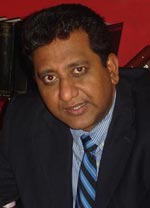Speaker must ensure those in his charge comply with Constitution
…AG Nandlall says following High Court ruling that Opposition has no power to cut National Budget
ATTORNEY General and Minister of Legal Affairs, Anil Nandlall, has issued a statement expressing regret that lawyers who appeared for the Speaker and the Opposition Leader in the recently concluded constitutional challenge to the 2012 Budget cuts have indicated their intention to cut the 2014 National Budget, in the face of a ruling by the Chief Justice that the Constitution does not give them the power to do so.
The Attorney General says it is the role of the Speaker to ensure that those under his charge comply with the Constitution, as declared by its guardian, the Judiciary.
Following is the full text of the statement issued yesterday by Minister Nandlall:
“I view with deep regret, and indeed, with profound concern, the pronouncements emanating from lawyers who appeared in the recently concluded constitutional challenge to the cuts inflicted on the 2012 Budget. I refer to the lawyers who appeared for the Speaker and the Leader of the Opposition, respectively, and who, significantly, are important leaders in both of the two major opposition parties in the National Assembly.
In essence, they have indicated the intention of their respective parties, to cut the 2014 Budget despite the clear, definitive and final pronouncement of the Chief Justice that the Opposition have no power under the Constitution or at law to do so.
In fact, and on the contrary, these very lawyers ought to be the ones advising their clients and other members of their parties, who are not lawyers, what the legal position is when a Court of law has pronounced on a matter of law. Of course, I am assuming that they themselves know what the position is. Although, I believe that they ought to know, one can never be sure. The position is, unless and until, a pronouncement made by a Court is set aside by another Court of competent jurisdiction, that pronouncement must be obeyed and respected by all, irrespective how wrong one may feel that pronouncement is. This is an elementary principle which harbours no exception whatsoever. It is designed to protect and maintain the integrity of the administration of justice, the rule of law, and indeed the entire society.
In this instance, the contumacious and contemptuous disregard for the judicial pronouncements is not coming from the ordinary citizen but from law-makers themselves, who are also political leaders. If these constitutionally and politically highly placed persons advocate and protagonise disrespect and disregard for judicial pronouncements, what message and what signal are they sending to the ordinary man. Why should he obey Court orders or the law, when those who make the law and who hold high political office, flaunt and flout them.
The Doctrine of Separation of Powers devolves onto the Executive, the Legislature and the Judiciary clearly delineated and defined powers and functional responsibilities. The Constitution recites them in its provisions. Each of these organs is expected to operate within their respective provinces and not to trespass on to the territorial power and responsibility of the other. Importantly, they must discharge their functions independently but with reciprocal comity. What will happen if the Judiciary is to reciprocate tomorrow and refuse to interpret the laws passed by the Legislature. Chaos and anarchy shall be the natural consequences. Moreover, the criticisms levelled against the Honourable Chief Justice for his ruling are not only wrong and baseless but are callous and undignified. Indeed, they are capable of being construed as an attack on the independence and integrity of the Judiciary. Those who are aggrieved are free to pursue an appeal against the ruling. Attacking and scandalising the judge is unlawful as it is distasteful.
In these challenging circumstances, the Speaker of the National Assembly has a pivotal role to play. As the authority in charge of the National Assembly, it is his responsibility to ensure that those under his charge comply with the Constitution as declared and pronounced by its guardian, the Judiciary. From this responsibility he cannot resile. He, himself, is a creature of the Constitution. The power he enjoys is derived from the Constitution. One can only hope that he protects and does not desecrate or aid and abet the desecration of his creator – the Constitution.”
source: Guyanachronicle


